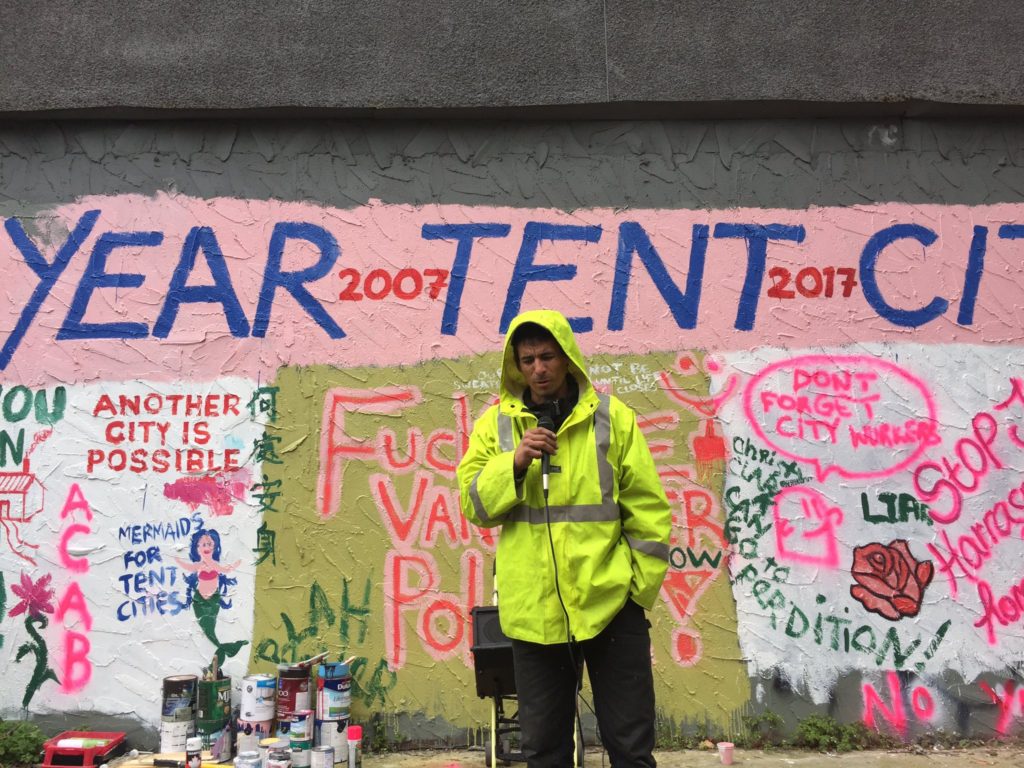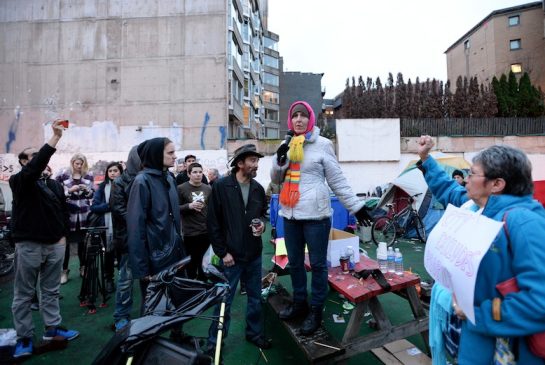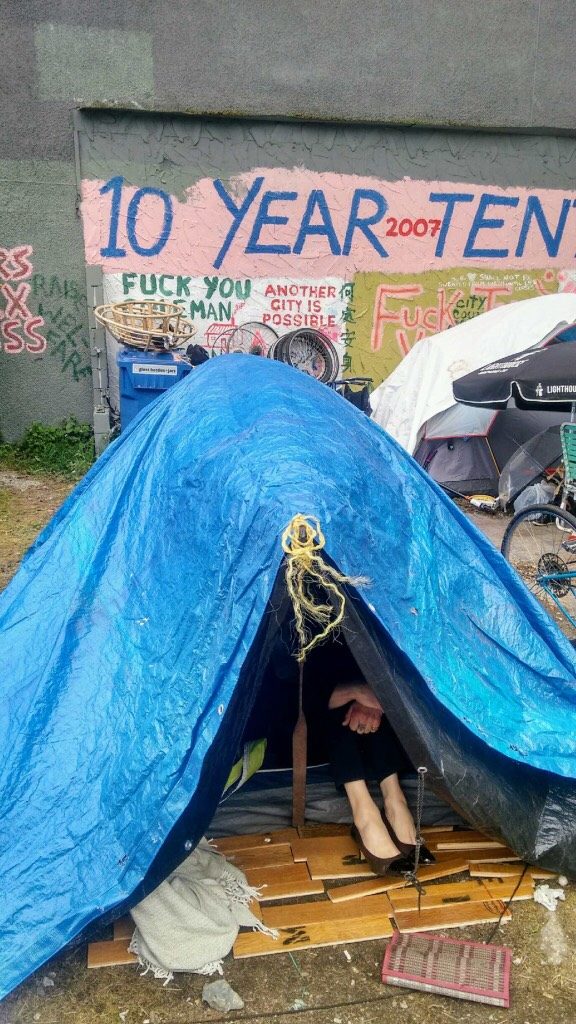
Saving lives, a sense of pride, and trans women’s safety at 10 Year Tent City: Affidavits from the defendants against the City of Vancouver’s failed injunction attempt
Judge Sharma’s decision to refuse Vancouver’s application for an injunction to break up Ten Year Tent City was based on the testimonials of homeless campers. These testimonies expose the conflict between private property rights and the lives and wellbeing of low-income, working-class, and Indigenous people, and that City depends on bylaws and policing to bolster the power of property owners, making homeless people more vulnerable to injury and death. These stories are the tip of iceberg of homeless people’s experiences with property and law; we should read them as evidence of a deep, everyday social injustice that Ten Year Tent City stands against.
Safety and community in a city of danger for homeless trans women
By Keya Archambolt
I am a 43 year old transgender woman. As a child, I endured physical and verbal abuse, and was forced to act straight and masculine. If I walked a certain way or held my cup a certain way, I would be beaten by my father.
At 15 I ran away from home to escape the abuse. In order to support myself, I joined a gang, sold drugs, and worked as a sex worker. In the same year, I became addicted to drugs. Since then, I’ve never had a real home.
I was incarcerated for nearly 15 years in California, where I grew up. When authorities found out I was born in Canada I was deported to Vancouver. Once I arrived in Vancouver, I found a job but I was soon outed as being transgender and was fired. Without a job or money for rent, I was soon on the streets again.
On the streets, my safety is constantly threatened. Every day, I am harassed and people yell transphobic slurs at me. I’ve been raped and beaten in the streets. I am also diagnosed with Hepatitis C, which gives me chronic fatigue. It makes it difficult for me to stay awake, leaving me vulnerable on the streets.
Shelters are not safe for transgender people. There aren’t any trans-dedicated shelters available for transgender people. Many women’s shelters are trans-exclusionary and force me to go to the men’s shelters where it is dangerous for trans women and puts me at risk of assault and abuse.
At the women’s shelters that do allow me to stay, I still face transphobic abuse, bullying, and harassment and I do not feel safe. Living in an SRO is also dangerous and not an option.
At the Ten Year Tent City I feel safe
On the street, when you’re by yourself you’re always a target. At the tent city I feel safe and have a sense of security. The tent city is gated, there’s 24 hour security and I haven’t had my things stolen once since I’ve been there whereas on the streets, things are constantly stolen and I am at risk for transphobic violence each day.
10 Year Tent City is trans inclusive and I sit on the council, which is women-led. I feel supported by the other campers on site. Once, when a stranger approached the tent city and started to harass me, all the other tent city campers surrounded me, protecting me and asked the man to leave. On the streets, no one sticks up for you, they just watch you get beat up.
The tent city has a strong community. I feel so grateful to be welcomed and accepted by Indigenous people at the camp, in this community. Everybody at 10 Year Tent City works together and we each volunteer for different shifts such as security, kitchen, cleaning, conflict resolution, and council. We have rules at tent city such as no violence, no stealing, and everyone pitches in to make sure it’s a clean and safe place for all.
We have access to water, food, washrooms, and first aid equipment on site. Narcan training is available to everyone at tent city. There was only one overdose at tent city, which was quickly attended to by Maria and tent city residents. If the man was alone on the streets he could have died.
Fire safety personnel have told us they are happy with everything. When they provide us with feedback, we follow through with their instructions immediately to ensure the tent city is safe. Each time the waste collectors come, they thank us for keeping the tent city clean and for helping them load the garbage.
If I got back on the street, I will not make it. As a transgender woman diagnosed with a chronic illness, it is life threatening to be on the streets or in shelters where I am always afraid and at risk for violence. I need a safe place to get treatment. I need a safe place to live.

The tent city gives me a sense of pride
By Rick Van der Waal
Before the tent city started, I lived in the woods on the Jericho Land after being displaced by park rangers and all items subsequently seized. I have been homeless for almost a decade.
I was one of the first 4 people who moved into the tent city on April 28th. At tent city we have safety in numbers. Our belongings are a lot more secure in this environment. It is secure from the city workers and park rangers, who seize our belongings with impunity.
Constantly having your stuff taken and stolen, lowers your morale. My drug intake rises when my stuff is stolen. I use less drugs since I stayed at tent city, because of the greater security.
Being in the tent city you are part of a community, and it makes you feel less marginalized. If that’s not a healthy and good thing, I don’t know what is?
Saving lives at tent city
We haven’t had any deaths at the tent city, and only one overdose. I have narcan kit, and I also got overdose prevention training at the tent city. In the tent city you can look out for each other, and drug users are safer.
Staying at tent city is pushing me closer to sobriety. It feels strange to be safe and to have my belongings secure after not having it for so long. That’s a right, not a privilege.
Bringing order to the uncertainty of homelessness
Our constitutional rights are not being upheld, we’re being treated as second-class citizens. The tent city brings awareness to our basic rights as citizens of this country. It feels good to be able to exercise them, and not be invisible.
There is a tent city council that oversees everything, including security. The council also does conflict resolution and distribution of supplies. Tent city creates a sense of routine and order, which we normally don’t have. I’m 47 years old, but it’s hard to have a routine on the streets. There is nothing but turmoil and hopelessness on the streets.
Here there is hope, because of a sense of order. People are coming together over seemingly impossible situations. What is impossible as an individual is possible as a group. The tent city installs a sense of pride in oneself and the community.
At shelters, they treat you like a number. Not as a human being. Being told that everything available to us is a privilege, not as a right. At shelter, you don’t have safety or security. It’s a temporary bandaid to a long-standing situation.
What is the cost of this tent city compared to a shelter? Tent city saves lives; it is a place of dignity.

He would be dead if it wasn’t for tent city
By Ilona Schild
I am a 52 year old woman. My parents passed away when I was 12. I grew up on the street in Vancouver. I lived in a hostel for teenage runaways for a few years. The hostel was positive in some ways, but they put a lot on us. It was hard. I had my eldest daughter when I was 17.
Later, I was married for 15 years and had a daughter who has autism. My husband died in 2008. I was devastated. My husband worked constantly to support my youngest daughter and me.
After he passed away I went downhill. I started using drugs. I couldn’t afford to take care of my daughter any more. I surrendered her to the government. She lives in assisted living. She’s getting the best care that she can.
About the same time that my husband died, I lost my mobile home due to some kind of legal technicality. My husband had taken care of the home and I didn’t know exactly what to do. I lost all my belongings that were in the home too. My whole life was in that place.
After that I was so depressed and lonely. Then I met Stacey. We talked and laughed a lot. After a while we started dating. Stacey and I have been homeless since then. Sometimes we live in shelters but mostly we live outside. We’ve had bad experiences in shelters and many shelters don’t let couples stay together.
Last summer we stayed at the tent city at 58 W Hastings, from the first day on July 9th until the last day on November 24th. When the tent city was displaced in late November, we were promised housing but we never got any housing.
Since being displaced from 58 W Hastings, Stacey and I have been sleeping outside. We tried to access shelters but they were all full. It was a really tough winter, very cold and snowy.
The Tent City has been really good for me
When the Ten Year Tent City opened at 950 Main Street, Stacey and I moved in there. We moved in on the second day and we have stayed there now for more than two weeks.
The tent city has been really good for me. It is quiet and there is no violence. People look out for each other. I feel safe there. There are tent city rules and fire safety rules. We take turns doing security shifts to make sure the tent city is safe and clean. It is working really well.
At the tent city, we’re stable. We can do things, like look for jobs or look for treatment. If we’re on the street or in a shelter we have to pick up all our stuff and carry it around. I can’t carry all my stuff looking for jobs. I need a place to stay.Because of the stability that tent city has provided, I have been able to get a job. I am going to work my first shift this Friday, May 19th.
One of the first days that we stayed at the tent city, Stacey overdosed. I called for help and Maria and tent city residents came to help. If Stacey had overdosed a few days earlier when we were staying on the street by ourselves, he would probably be dead. We don’t have a cellphone and we can’t call 911 for help.
When we’re here, we don’t get people teasing us or laughing at us. When we’re living on the street you get people laughing at us, calling us names. We’re binners and people say all kind of awful things to us. Someone threw an egg at me once. At tent city, people leave you alone.
Also, I can be with Stacey. When we’re in shelters we have to stay apart all the time. I miss him when we’re apart. He’s the person I can talk to about emotions, about things I’ve been through in my life. We’ve stuck by each other through everything. We want to stay together.
If we are displaced from the tent city, we will have to go back to sleeping on the street. The shelters are full and we haven’t been offered any housing.
Stacey and I need stable housing. Without it I can’t eat properly or take care of my body. I’ve lost some of my teeth. We’ve been denied housing so many times because of our credit history. We can’t find housing anywhere. Renting is so hard.
I would rather have a home. I’m tired of moving from place to place. My feet are banged up from walking a ton. My back and hips are sore. I have osteoarthritis on my knees.
Stacey and I both have Hep C. We’re supposed to have treatment for that but we can’t when we don’t have a home. The longer we wait the worst our health will become. We need to be in a stable place. The camp is more stable than being on the street or being in the shelter.

